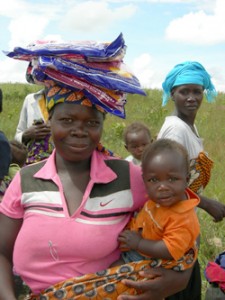
A mother carries home LLINs for her family following a net distribution campaign. Source: PSI/Angola
Malaria is one of the largest health concerns in Angola, particularly for pregnant women and young children. Using a long-lasting insecticide-treated net (LLIN) can greatly reduce the risk of malaria. The Ministry of Health is scaling up malaria control activities with expansion of net distribution as well as communication activities for behavior change to encourage the use of a net every night.
With support from the President’s Malaria Initiative and ExxonMobil, the Global Fund to Fight AIDS, Tuberculosis and Malaria, Population Services International (PSI) works with the National Malaria Control Program to develop communication campaigns based on evidence gathered through research to promote healthier behaviors for malaria control.
All communication campaigns are based on in-depth research into behaviors related to malaria control. These results help target communication campaigns to achieve the desired behavior change for malaria prevention and treatment. A recently completed qualitative study supported by Global Fund Round 7 looked at behaviors and beliefs of pregnant women and caregivers of children under the age of 5 years to further understand why mosquito nets are or are not used. In-depth interviews were complemented by a photo narrative of the women’s lives, where study participants took pictures of important factors in their lives that influence their health and the health of their children. Results were analyzed by groups – those who always use a net and those who do not consistently use a net. [Read more…]